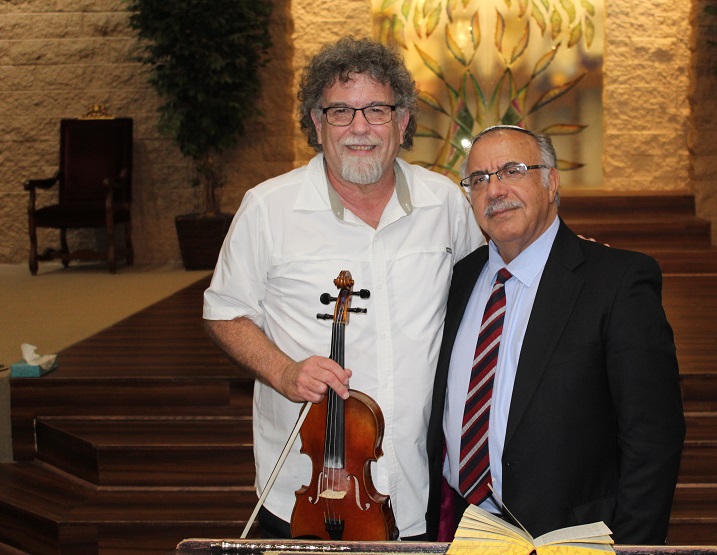 From left: Cantor Michael Stein and Rabbi Ruben Malekan
From left: Cantor Michael Stein and Rabbi Ruben Malekan For centuries after the Arab Islamic conquest of Iran, my Jewish community in Iran were the primary source that was retaining and maintaining the country’s musical heritage as music was forbidden in Shiite Islam that had taken over the country. The Jews became among the only musicians and instrument manufacturers in the country and many were also musicians for the royal courts of many kings that ruled Iran. Even for the last four decades as the majority of Jews have fled or have been exiled from Iran after the 1979 Islamic revolution, Iranian Jews in America, Europe and Israel have still maintained a love for listen to and performing Iranian traditional and modern music. In Los Angeles and New York, Iranian Jews are among the largest supporters and patrons of Iranian musical performances and singers.
While music has become a part of religious services for many Iranian Jews attending Ashkenazi synagogues, the traditional Iranian synagogues have not incorporated any music into their services. Yet on September 19th history will be made as L.A.’s Rabbi Ruben Malekan will be chanting a selection of the traditional Selichot prayers with the traditional Mizrahi melodies along with traditional Persian instrumental music for the community in a rare spiritual performance. I recently caught up with Malekan to discuss his motivation for the Selichot services where he will be singing the traditional Jewish prayers of repentance, but also be accompanied by the instrumental performance of Manoochehr Sadeghi, who is considered the world’s foremost grandmaster Santur musician. The Santur, or a Persian hammered dulcimer is a string instrument which produces a distinctly Persian or Middle Eastern music. Likewise local Temple Aliyah’s Ashkenazi Cantor Michael Stein and his son violinist Jared Stein will be performing at the gathering which Malekan believes “will elevate people’s souls and better prepare them for high holy days of Rosh Hashana and Yom Kippur”. Sadeghi, who is not Jewish but from the Bahai faith, is not only respected by all in the Iranian community but consider a virtuoso of the Santur worldwide.
For many Iranian Jews who will never have a chance to return back to Iran because of the current radical Islamic regime in power there, the traditional music of the country helps re-connect them to their cultural and even religious heritage. Many Iranian Jewish community members I have interviewed over the years have told me they are moved spiritually and feel more connected to their ancient Jewish heritage when they hear prayers chanted in their traditional Mizrahi melodies. The Selichot prayers themselves are pleas for mercy and their melodies are sad and yet when chanted properly, the prayers are an expression of emotional despair that one feel while separated from God and the desire to change and repent. No doubt the powerful words of the prayers from Malekan and instrumental accompaniment will stir and move those during this special holiday season for the Jewish community.
For more information on the Selichot musical performances at the IAJF synagogue visit their site.
The following are some of the brief portions of Malekan’s moving prayers and his performance with Temple Aliyah’s Cantor Michael Stein which I was able to capture…






















 More news and opinions than at a Shabbat dinner, right in your inbox.
More news and opinions than at a Shabbat dinner, right in your inbox.